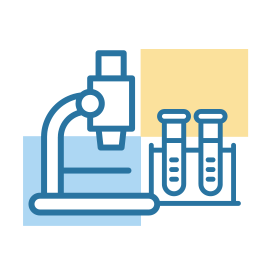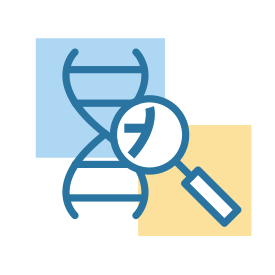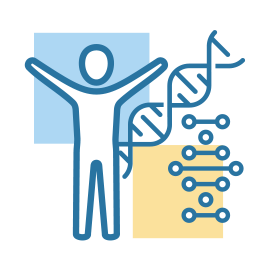
Help us drive progress
We need faster, easier diagnosis and deeper, clearer understanding of this rare disease so we can find better ways to treat it. The burdens are many, and the patients are waiting.

Open Source Research Tools
Develop the most relevant and reliable tools to use for research and make them easily accessible to any researcher.
Questions and Topics for Focus
Maintenance of pig brain function under extracorporeal pulsatile circulatory control (EPCC) (2023)
Deep Transfer Learning-Based Approach for Glucose Transporter-1 (GLUT1) expression Assessment (2023)
Maintenance of pig brain function under extracorporeal pulsatile circulatory control (EPCC) (2023)
Quantitative determination of SLC2A1 variant functional effects in GLUT1 deficiency syndrome (2023)
Focused on this Topic
Contact us if you'd like your team or lab included.
Christina Gurnett, MD, PhD
Washington University St. Louis
St. Louis, Missouri USA
Juan Pascual, MD, PhD
UT Southwestern Medical Center
Dallas, Texas USA
Maoxue Tang, PhD
Columbia University Medical Center
New York, New York USA

Cells
More clearly define the cell types involved in the disease, their locations in the body, and which ones can and should be targeted for treatment.
Questions and Topics for Focus
Focused on this Topic
Contact us if you'd like your team or lab included.
Abraham Al-Ahmad, PhD
Texas Tech University
Amarillo, Texas USA
Christina Gurnett, MD, PhD
Washington University St. Louis
St. Louis, Missouri USA
Juan Pascual, MD, PhD
UT Southwestern Medical Center
Dallas, Texas USA
Ivy Samuels, PhD
Louis Stokes VA Medical Center, Cole Eye Institute - Cleveland Clinic
Cleveland, Ohio USA
Maoxue Tang, PhD
Columbia University Medical Center
New York, New York USA

Glut1 - The Transporter Protein
Better understand the function of Glut1, what influences that function, and how malfunctions can be corrected.
Questions and Topics for Focus
Focused on this Topic
Contact us if you'd like your team or lab included.
Felipe Barros, MD, PhD
Centro de Estudios Científicos
Valdivia, Chile
Prof. Dr. Katrien De Bock
ETH Zürich
Zürich, Switzerland
Prof. Dr. Jörg Klepper
Aschaffenburg Children's Hospital
Aschaffenburg, Germany
Amy Nelson, PhD
University of South Alabama
Mobile, Alabama USA
Juan Pascual, MD, PhD
UT Southwestern Medical Center
Dallas, Texas USA
Maoxue Tang, PhD
Columbia University Medical Center
New York, New York USA

Metabolism
Better understand the metabolic functions that are impaired by Glut1 Deficiency and identify ways to compensate.
Questions and Topics for Focus
In situ microwave fixation provides an instantaneous snapshot of the brain metabolism (2023)
Metabolic Recruitment in Brain tissue (2023)
Brain Energy metabolism: Astrocytes in neurodegenerative diseases (2023)
PFKFB2-mediated glycolysis promotes lactate-driven continual efferocytosis by macrophages (2023)
Glut1 is a highly efficient L-fucose transporter (2022)
Metabolic recruitment of brain tissue (2022)
GLUT1 production in cancer cells: a tragedy of the commons (2022)
Role of the gut-brain axis in energy and glucose metabolism (2022)
AMPK in the brain: its roles in glucose and neural metabolism (2022)
Potential mechanisms to modify impaired glucose metabolism in neurodegenerative disorders (2022)
Glucose metabolic crosstalk and regulation in brain function and diseases (2021)
Glucose, glycolysis, and neurodegenerative diseases (2020)
Regional differences in brain glucose metabolism determined by imaging mass spectrometry (2018)
Glut1 deficiency syndrome: New and emerging insights into a prototypical brain and energy failure disorder (2021)
Glia-neuron energy metabolism in health and diseases: New insights into the role of the nervous system metabolic transporters (2018)
PKCs Sweeten Cell Metabolism by Phosphorylation of Glut1 (2015)
Focused on this Topic
Contact us if you'd like your team or lab included.
Felipe Barros, MD, PhD
Centro de Estudios Científicos
Valdivia, Chile
Mattia Bonzanni, PhD
Tufts University
Boston, Massachusetts USA
Prof. Dr. Katrien De Bock
ETH Zürich
Zürich, Switzerland
Matthew Gentry, PhD
University of Florida
Gainesville, Florida USA
Juan Pascual, MD, PhD
UT Southwestern Medical Center
Dallas, Texas USA
Prof. Dr. Michél Willemsen
Radboud University Medical Center
Nijmegen, Netherlands
Robin Williams, PhD
Royal Holloway
London, England

Genetics
Identify all the genes that may play a role in Glut1 Deficiency, how defects in the genes contribute to disease, and how their function can be repaired.
Questions and Topics for Focus
Impoverished Conceptions of Gene Causation and Therapy in developmental Neurology (2023)
Genetic Modulation of the Glut1 Transporter Expression - Potential Relevance in Complex Diseases
The glucose transporter type 1 (Glut1) syndromes (2018)
GLUT1-deficiency syndrome: Report of a four-generation Norwegian family with a mild phenotype (2017)
Phenotypic and Genotypic Spectrum of Glucose Transporter-1 Deficiency Syndrome (2021).
Variety of Symptoms of GLUT1 Deficiency Syndrome in Three-Generation Family (2020)
Mutations in Disordered Regions Can Cause Disease by Creating Dileucine Motifs (2018)
Mutational and functional analysis of Glucose transporter I deficiency syndrome (2015)
Pathogenic mutations causing glucose transport defects in GLUT1 transporter: The role of intermolecular forces in protein structure-function (2015)
Absence of SLC2A1 Mutations Does Not Exclude Glut1 Deficiency Syndrome (2013)
Evaluation of non-coding variation in GLUT1 deficiency (2016)
Screening of SLC2A1 in a large cohort of patients suspected for Glut1 deficiency syndrome: identification of novel variants and associated phenotypes (2019)
Glut1 Deficiency Syndrome (Glut1DS): State of the art in 2020 and recommendations of the international Glut1DS study group (2020)
GENE THERAPY
Focused on this Topic
Contact us if you'd like your team or lab included.
Kris Engelstad, MS, CGC
Columbia University Medical Center
New York City, USA
Christina Gurnett, MD, PhD
Washington University St. Louis
St. Louis, Missouri USA
Umrao Monani, PhD
Columbia University
New York City, USA
Juan Pascual, MD, PhD
UT Southwestern Medical Center
Dallas, Texas USA
Maoxue Tang, PhD
Columbia University Medical Center
New York, New York USA

Pathogenesis
Better define the clinical course of Glut1 Deficiency, what causes the symptoms, and why they change over time.
Questions and Topics for Focus
Lower GLUT1 and unchanged MCT1 in ALzheimer’s disease cerebrovasculature (2024)
Visual-sensitive epilepsy in GLUT-1 deficiency syndrome: Expanding the phenotype (2023)
Hypometabolism, ALzheimer’s Disease, and Possible Therapeutic Targets: An Overview (2023)
Glucose metabolism: A link between traumatic brain injury and Alzheimer’s disease (2021)
Brain metabolism in Alzheimer’s disease: biological mechanisms of exercise (2023)
AMPK-mediated potentiation of GABAergic signalling drives hypoglycaemia-provoked spike-wave seizures
Intermittent Alternating Eye-Head Synkenesia in Glut1 Deficiency Syndrome (2021)
Phenotypic and Genotypic Spectrum of Glucose Transporter-1 Deficiency Syndrome (2021)
Clinical and Genetic Overview of Paroxysmal Movement Disorders and Episodic Ataxias (2020)
GLUT1 deficiency: Retinal detrimental effects of gliovascular modulation (2020)
Long-Term Clinical Course of Glut1 Deficiency Syndrome (2015)
GLUT1 deficiency syndrome into adulthood: a follow-up study (2014)
Glucose Transporter Type 1 Deficiency Syndrome: Gene Reviews (2002)
Focused on this Topic
Contact us if you'd like your team or lab included.
Prof. Dr. Jörg Klepper
Aschaffenburg Children's Hospital
Aschaffenburg, Germany
Umrao Monani, PhD
Columbia University
New York City, USA
Juan Pascual, MD, PhD
UT Southwestern Medical Center
Dallas, Texas USA

Therapy Development
Better understand the benefits and limitations of current therapies and develop new and better ones.
Questions and Topics for Focus
Glut1 is a highly efficient L-fucose transporter (2022)
Lactate infusion as therapeutical intervention: a scoping review (2022)
A randomized, double-blind trial of triheptanoin for drug-resistant epilepsy in glucose transporter 1 deficiency syndrome (2022)
Exploring diazoxide and continuous glucose monitoring as treatment for Glut1 deficiency syndrome (2021)
Clinical and Genetic Overview of Paroxysmal Movement Disorders and Episodic Ataxias (2020)
Glucose transporter type 1 deficiency syndrome and the ketogenic diet (2019)
Ketogenic Diet in Patients with GLUT1 Deficiency Syndrome (2019)
Quality of Life in Chronic Ketogenic Diet Treatment: The GLUT1DS Population Perspective (2019)
Failure of ketogenic diet therapy in GLUT1 deficiency syndrome (2019)
Use of modified Atkins diet in glucose transporter type 1 deficiency syndrome (2016)
Use of dietary therapies amongst patients with GLUT1 deficiency syndrome (2016)
Outcome of ketogenic diets in GLUT1 deficiency syndrome in Japan: A nationwide survey (2016)
Therapeutic Strategies for Glucose Transporter 1 Deficiency Syndrome (2016)
Glucose transporter deficiency syndrome (GLUT1DS) and the ketogenic diet (2008)
Focused on this Topic
Contact us if you'd like your team or lab included.
Mattia Bonzanni, PhD
Tufts University
Boston, Massachusetts USA
Christina Gurnett, MD, PhD
Washington University St. Louis
St. Louis, Missouri USA
Prof. Dr. Jörg Klepper
Aschaffenburg Children's Hospital
Aschaffenburg, Germany
Eric Kossoff, MD
Johns Hopkins Hospital
Baltimore, Maryland USA
Umrao Monani, PhD
Columbia University
New York City, USA
Amy Nelson, PhD
University of South Alabama
Mobile, Alabama USA
Juan Pascual, MD, PhD
UT Southwestern Medical Center
Dallas, Texas USA
Maoxue Tang, PhD
Columbia University Medical Center
New York, New York USA
Robin Williams, PhD
Royal Holloway
London, England

Clinical Tools
Develop tools to improve the diagnostic process, support better clinical care, and advance meaningful treatment development.
Questions and Topics for Focus
A high fat diet potentiates neonatal iron overload-induced memory impairments in rats (2024)
Nutritional Intervention Through Ketogenic Diet in GLUT1 Deficiency Syndrome (2023)
Ketonemia variability through menstrual cycle in patients undergoing classic ketogenic diet (2023)
Case report: KETOLAND the psychoeducation program for ketogenic diet (2023)
Glucose transporter type 1 deficiency syndrome: clinical aspects, diagnosis, and treatment (2023)
A concise study of acetazolamide in Glut1 deficiency (G1D) epilepsy (2023)
Combination of triheptanoin with ketogenic diet in Glucose transporter type1 deficiency (G1D) (2023)
Genetic Links to Episodic Movement Disorders: Current Insights (2023)
Spotlighting the zebras: A Role for Medical Students in Shaping Rare Disease Care (2022)
Abnormal gait and hypoglycorrhachia in a toddler with seizures (2022)
Hemidystonia and hemichorea in a pediatric patient with glucose transporter type 1 deficiency (2022)
Sleep Disorder: An Overlooked Manifestation of Glucose Transporter Type-1 Deficiency Syndrome (2021)
Aspirin, a potential GLUT1 inhibitor in vascular endothelial cell line (2019)
Development of a rapid functional assay that predicts GLUT1 Disease severity (2018)
Blood test accurately detects GLUT1 Deficiency Syndrome (2017)
Overall cognitive profiles in patients with GLUT1 Deficiency Syndrome
Cerebrospinal Fluid Analysis in the Workup of GLUT1 Deficiency Syndrome: A Systematic Review (2013)
The role for ketogenic diets in epilepsy and status epilepticus in adults (2017)
Payroxysmal Eye-Head Movements in Glut1 Deficiency Syndrome (2017)
Stroke mimics add to the phenotypic spectrum of Glut1 deficiency syndrome (2017)
Upstream SLC2A1 translation initiation causes GLUT1 deficiency syndrome (2017)
Sporadic and familial glut1ds Italian patients: A wide clinical variability (2015)
Long-Term Clinical Course of Glut1 Deficiency Syndrome
GLUT1 deficiency syndrome into adulthood: a follow-up study (2015)
A novel SLC2A1 mutation linking hemiplegic migraine with alternating hemiplegia of childhood (2014)
Healthcare for persons with intellectual and developmental disability in the community (2014)
SLC2A1 gene analysis of Japanese patients with glucose transporter 1 deficiency syndrome (2011)
Glucose Transporter Type 1 Deficiency Syndrome: Gene Reviews (2002)
Focused on this Topic
Contact us if you'd like your team or lab included.
Matthew Gentry, PhD
University of Florida
Gainesville, Florida USA
Prof. Dr. Jörg Klepper
Aschaffenburg Children's Hospital
Aschaffenburg, Germany
Juan Pascual, MD, PhD
UT Southwestern Medical Center
Dallas, Texas USA
Toni Pearson, MBBS
Nationwide Children's Hospital
Columbus, Ohio USA
Prof. Dr. Michél Willemsen
Radboud University Medical Center
Nijmegen, Netherlands

